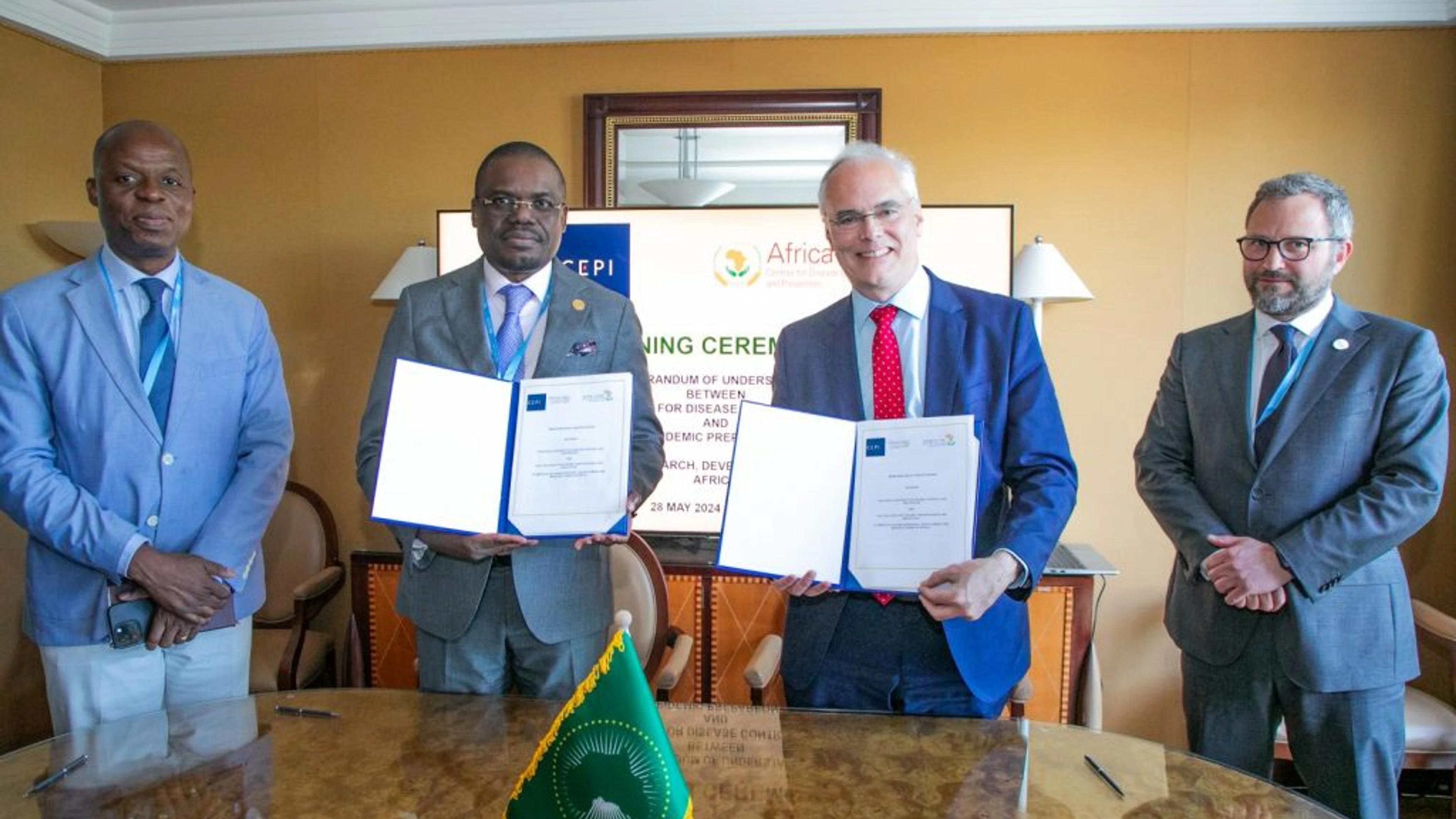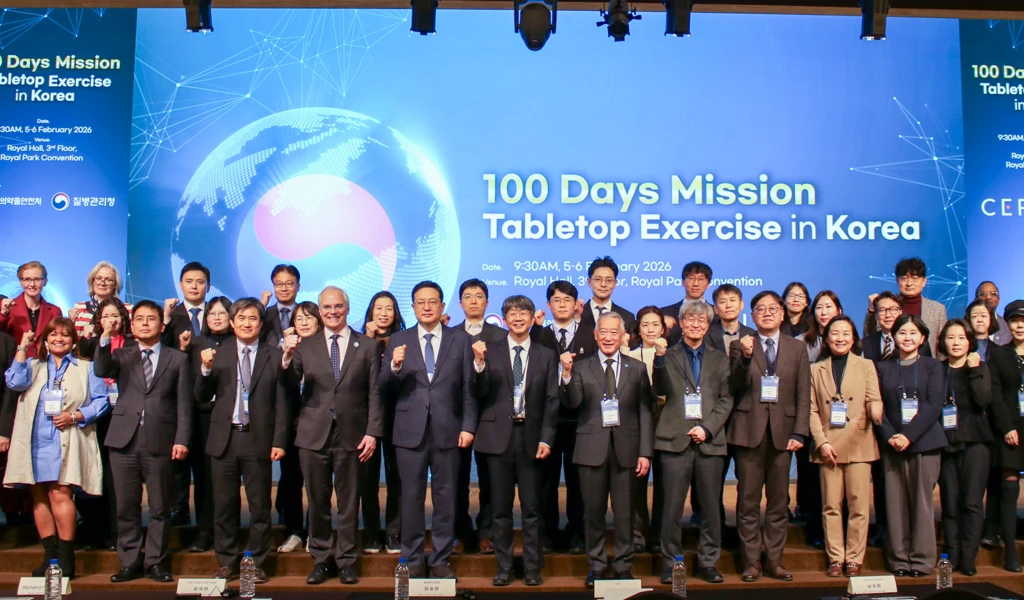Africa CDC and CEPI deepen partnership to fortify African preparedness against disease outbreaks

May 28, 2024; Geneva, Switzerland:The Africa Centres for Disease Control and Prevention (Africa CDC) and the Coalition for Epidemic Preparedness Innovations (CEPI) signed a Memorandum of Understanding (MoU) on the sidelines of the 77th World Health Assembly to expand their partnership to strengthen epidemic and pandemic prevention, preparedness and response in Africa.
United by a shared mission, the organizations will collaborate to boost regional vaccine research, development, and sustainable manufacturing leadership and capabilities in Africa, fostering a faster and more equitable response to emerging infectious diseases.
"The New Public Health Order calls to action to build resilient health systems capable of managing recurrent, high-impact infectious disease and outbreaks; an action-oriented partnership such as this is at the core," said Dr. Jean Kaseya, Africa CDC's Director General. "This collaboration with CEPI in research, clinical trials, and local manufacturing of medical countermeasures will elevate Africa's readiness against outbreaks, epidemics, and pandemics, thus consolidating the continent's preparedness far beyond where we were prior to the COVID-19 pandemic."
“African leadership and capabilities will be key for ensuring the continent can respond to increasingly frequent infectious disease outbreaks,” said Richard Hatchett, CEPI's Chief Executive Officer. “The preparatory work to manage these outbreaks—from greater vaccine manufacturing capacity to clinical trial readiness—must be undertaken now. CEPI stands ready to support Africa CDC in the realisation of these goals and to further strengthen Africa’s preparedness and resilience against future outbreaks.”
In line with the African Union's (A.U.) ambition to produce 60% of the continent's vaccine needs in Africa by 2040 under the Africa CDC’s Partnerships for African Vaccine Manufacturing (PAVM), the expanded partnership will ultimately focus its efforts on enhancing research and development, building a workforce as well as supply chain optimization to support resilient health systems. This ambition will increase vaccine sovereignty and reduce external reliance, helping prevent a recurrence of the vaccine inequity seen during the COVID-19 response in Africa.
To boost vaccine accessibility and efficiency and meet this goal, there is a need to invest in vaccine R&D and manufacturing innovations, amongst others, and build a resilient regional supply chain. To that end, Africa CDC and CEPI will coordinate to fund innovations accelerating speed, scale, or accessibility for initial implementation with African manufacturers. This investment will support sustainable manufacturing for routine vaccinations in Africa, and—in the event of an outbreak—these facilities can be mobilized to produce response vaccines promptly.
In alignment with Africa CDC, the partnership also aims to bolster Africa's research ecosystem and clinical trial infrastructure, including targeted capacity strengthening through CEPI's Research Preparedness Program—which, directed by regional experts, aims to build capacity for conducting high-quality Phase 3 efficacy trials.
Building on existing clinical trial capability in some African countries is vital as vaccine candidates against endemic diseases, such as Lassa fever, progress into late-stage development. Phase 3 trials provide essential data required for vaccine approval and must take place in regions where the disease is prevalent. A CEPI-funded Phase 2 trial for a Lassa fever vaccine candidate is already underway; it is crucial that if this candidate, or another, is successful, there is regional capability to further its path toward licensure. Once established, this capability can benefit other regional actors advancing to late-stage research.
The organizations will also collaborate to enhance vaccine safety protocols, biosecurity, pathogen surveillance, investment in capacity building, and other areas that help ensure overall African readiness for emergency vaccine responses.
Africa CDC and CEPI are committed to this cooperation, which will strengthen collaboration and deliver tangible results to deliver Africa's long-term health security ambitions.
ENDS
Notes to Editors
About CEPI
CEPI was launched in 2017 as an innovative partnership between public, private, philanthropic and civil organisations. Its mission is to accelerate the development of vaccines and other biologic countermeasures against epidemic and pandemic disease threats and enable equitable access to them. CEPI has supported the development of more than 50 vaccine candidates or platform technologies against multiple known high-risk pathogens and is also advancing the development of rapid response platforms for vaccines against a future Disease X. Central to CEPI’s pandemic-beating five-year plan for 2022-2026 is the ‘100 Days Mission’ to compress the time taken to develop safe, effective, globally accessible vaccines against new threats to just 100 days.
About Africa CDC
About Africa CDC: The Africa Centres for Disease Control and Prevention (Africa CDC) is a continental autonomous public health agency of the African Union that supports member states in their efforts to strengthen health systems and improve surveillance, emergency response, and prevention and control of diseases. Learn more at: http://www.africacdc.org


.webp)
